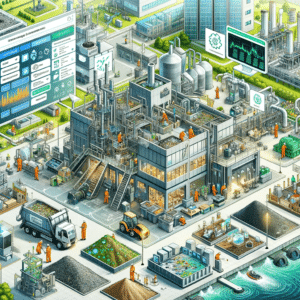Discover the essential practices for managing waste, soil, and water to comply with regulations and support environmental sustainability. Unlock the secrets to eco-friendly compliance: transform waste and water management with cutting-edge solutions! Dive into our latest insights on innovative recycling techniques and advanced treatment processes, paving the way for environmental stewardship. Learn how to navigate the regulatory landscape while promoting a healthier, more sustainable world.
Essential Practices for Waste Soil and Water Management Compliance
In Australia, managing waste soil and water efficiently and responsibly is a critical aspect of environmental compliance. Effective waste management practices not only safeguard our water sources and soil integrity but also contribute to the preservation of natural resources. Emphasizing the proper disposal and treatment of various types of waste, including organic waste, industrial wastes, and more, is essential in minimizing the environmental impact and protecting both environment and human health.
- Implementing Organic Waste Recycling: Recycling organic waste is a fundamental practice. It not only diverts waste from landfills but also turns it into valuable resources like compost, which improves crop yield and enhances soil health.
- Adopting Advanced Waste Management Practices: Employing advanced waste management practices is crucial. This includes state-of-the-art technologies for sorting, treating, and recycling different types of waste to minimize environmental impact.
- Prioritizing Proper Waste Handling: Ensuring proper handling of waste, especially hazardous and industrial wastes, is essential. This includes safe collection, transportation, and processing to prevent contamination of water sources and soil.
- Optimizing Waste Disposal Methods: Streamlining waste disposal methods to make them more efficient and less harmful to the environment. This involves finding ways to reduce the volume of waste that requires disposal and identifying sustainable disposal options.
- Conserving Natural Resources: Practices that focus on the conservation of natural resources are vital. This includes minimizing the use of raw materials in production processes and promoting recycling and reuse.
- Educating and Training: Conducting regular education and training sessions for staff and stakeholders on the importance of responsible waste management and the impact of improper practices on the environment and human health.
- Regular Compliance Audits: Performing regular audits to ensure that waste soil and water management practices are in line with current regulations and standards, and making necessary adjustments to maintain compliance.
Streamlining Waste Soil and Water Management for Legal Adherence
Legal adherence in waste management involves understanding and implementing regulatory requirements. These laws are designed to ensure that waste disposal does not harm the environment or public health. Effective management strategies must incorporate the following:
Understanding Regulatory Frameworks: Keeping abreast of the latest environmental regulations and understanding their implications for waste management practices.
- Implementing Compliance Strategies: Developing and implementing strategies that ensure all waste management practices are in compliance with legal requirements.
- Leveraging Technology for Compliance: Utilizing technology to track, manage, and report waste management activities, ensuring transparency and compliance with legal standards.
- Partnering with Certified Waste Handlers: Collaborating with certified and experienced waste handlers to ensure that all aspects of waste management are conducted in a legally compliant manner.
- Documenting Waste Management Processes: Maintaining thorough documentation of all waste management processes, from collection to disposal, for regulatory compliance and auditing purposes.
- Regular Legal Updates and Training: Keeping the team updated with the latest legal changes and providing training to ensure understanding and adherence to these changes.
- Risk Assessment and Management: Conducting regular risk assessments to identify potential legal compliance issues and implementing management strategies to mitigate these risks.
Minimizing Environmental Impact through Proactive Waste Management
Proactive waste management is key to minimizing the environmental impact of waste soil and water. This involves:
- Promoting Waste Reduction at the Source: Encouraging reduction of waste generation at the source, which is a key step in minimizing environmental impact.
- Enhancing Recycling Efforts: Strengthening recycling programs to ensure more materials are reused and kept out of landfills.
- Implementing Sustainable Disposal Practices: Adopting sustainable disposal practices, such as using waste for energy production through methods like anaerobic digestion or incineration with energy recovery.
- Innovating in Waste Treatment Technologies: Investing in and adopting innovative waste treatment technologies that are less harmful to the environment.
- Sustainable Water Management: Implementing practices to ensure sustainable management of water resources, especially in processes involving waste water.
- Ecosystem-Friendly Waste Handling: Designing and implementing waste handling processes that are mindful of their impact on local ecosystems and biodiversity.
- Community Engagement and Education: Engaging with local communities and educating them about the importance of responsible waste management and its role in protecting the environment.
Achieving Eco-Responsibility through Effective Waste Soil and Water Strategies
Achieving eco-responsibility requires a commitment to effective waste soil and water management strategies. These strategies should focus on not only complying with regulations but also going a step further to ensure the conservation and sustainable use of natural resources. This includes:
- Integrating Renewable Energy in Waste Management: Utilizing renewable energy sources like solar and wind power in waste management facilities to reduce carbon footprint and promote sustainability.
- Developing Closed-loop Systems: Creating closed-loop systems where waste products are continuously recycled and reused, minimizing the need for new raw materials and reducing environmental impact.
- Enhancing Soil Health through Organic Waste: Utilizing organic waste to create compost and other soil enhancers, which improve soil health and reduce the need for chemical fertilizers.
- Eco-Friendly Packaging Solutions: Promoting the use of eco-friendly packaging that can be easily recycled or decomposed, thereby reducing waste soil contamination.
- Water Conservation Techniques: Implementing water conservation techniques in waste management processes to reduce water usage and safeguard water sources.
- Green Infrastructure for Waste Processing: Designing waste processing facilities with green infrastructure, such as green roofs and rain gardens, to minimize environmental impact.
- Promoting Public Awareness and Involvement: Engaging the public through awareness campaigns and involvement opportunities to foster a community-wide commitment to eco-responsible waste management practices.
Safeguarding Water Resources and Soil Integrity through Sound Waste Management
The safeguarding of water resources and soil integrity is a crucial aspect of sound waste management. Effective waste management practices should aim to prevent contamination of water bodies and degradation of soil quality. This involves:
Implementing Rigorous Water Treatment Protocols: Adopting stringent water treatment protocols to ensure that waste water is adequately treated before being released back into the environment.
- Soil Remediation Techniques: Applying advanced soil remediation techniques to restore contaminated sites, thereby protecting soil integrity and preventing further environmental degradation.
- Monitoring and Controlling Leachate: Rigorously monitoring and controlling leachate from landfills to prevent soil and water contamination.
- Safe Handling of Hazardous Wastes: Ensuring safe and secure handling of hazardous wastes to prevent soil and water pollution.
- Advanced Filtration Systems for Water Protection: Installing advanced filtration systems in waste processing to prevent harmful contaminants from reaching water sources.
- Ecosystem Impact Assessments: Conducting regular ecosystem impact assessments to understand and mitigate the effects of waste management practices on local ecosystems.
- Collaboration with Environmental Agencies: Collaborating with environmental agencies to develop and implement strategies for protecting water resources and soil integrity.
Navigating Waste Soil and Water Regulations with Practical Expertise
Navigating the complex landscape of waste soil and water regulations requires practical expertise. This expertise is crucial in understanding the intricacies of environmental laws and implementing them effectively. Professionals in this field play a vital role in guiding businesses and industries to comply with these regulations while maintaining operational efficiency.
- Staying Informed on Regulatory Changes: Keeping up-to-date with the latest changes in waste management regulations to ensure ongoing compliance.
- Expert Consultations for Compliance: Engaging with environmental experts to receive guidance on navigating complex waste management regulations.
- Tailored Compliance Strategies for Different Wastes: Developing tailored compliance strategies for different types of waste, considering their unique environmental and regulatory challenges.
- Training Programs on Regulatory Compliance: Implementing regular training programs for staff on regulatory compliance in waste management.
- Compliance Audits and Reviews: Conducting periodic compliance audits and reviews to ensure that waste management practices are in line with current regulations.
- Collaboration with Regulatory Bodies: Building strong relationships with regulatory bodies to facilitate better understanding and compliance with waste management regulations.
- Implementing Best Practices Beyond Compliance: Adopting best practices that go beyond the minimum regulatory requirements to demonstrate leadership in environmental stewardship.
Harnessing Sustainable Practices for Optimal Waste Soil and Water Management
Harnessing sustainable practices is vital for optimal waste soil and water management. These practices focus on reducing the generation of waste and reusing materials wherever possible. Sustainable waste management not only complies with legal standards but also aligns with the broader goals of environmental conservation and sustainability.
-
- Integrating Circular Economy Concepts: Embracing the principles of the circular economy by ensuring that waste materials are reused, remanufactured, or recycled, thereby reducing the need for raw materials and minimizing waste generation.
- Fostering Energy Production from Waste: Utilizing technologies that convert waste into energy, such as biogas production from organic waste, which contributes to sustainable electricity generation and reduces reliance on fossil fuels.
- Implementing Water Conservation Techniques: Employing water conservation methods in waste management processes, including rainwater harvesting and wastewater recycling, to protect water sources and reduce water consumption.
- Adopting Soil Improvement Practices: Utilizing waste products like compost and biochar to improve soil quality, which not only manages waste efficiently but also enhances soil health for agricultural purposes.
- Green Procurement Policies: Establishing green procurement policies that prioritize products and services with minimal environmental impact, including those related to waste management and disposal.
- Encouraging Community Composting: Promoting community-level composting initiatives that convert organic waste into valuable compost, improving soil health and reducing waste sent to landfills.
- Developing Eco-friendly Packaging Solutions: Encouraging the development and use of eco-friendly packaging materials that are easily recyclable or biodegradable, reducing the volume of waste soil and water contamination.
- Leveraging Sustainable Transportation for Waste: Opting for sustainable transportation options for waste transfer, such as electric or hybrid vehicles, to reduce carbon emissions associated with waste management.
Ensuring Long-Term Compliance with Comprehensive Waste Management Plans
To ensure long-term compliance, comprehensive waste management plans are essential. These plans should encompass all aspects of waste management, from:
- Conducting Environmental Impact Assessments: Regularly conducting environmental impact assessments to understand the effects of waste management practices and make necessary adjustments for compliance.
- Developing Adaptive Management Strategies: Creating flexible and adaptive waste management strategies that can evolve with changing regulations and environmental conditions, ensuring long-term compliance.
- Integrating Technology for Monitoring and Reporting: Utilizing advanced technology solutions for monitoring waste management processes and providing accurate reporting to regulatory bodies for compliance verification.
- Building Robust Emergency Response Plans: Developing comprehensive emergency response plans for potential waste management incidents, ensuring rapid and effective action to minimize environmental damage.
- Engaging Stakeholders in Compliance Processes: Involving all stakeholders, from employees to local communities, in understanding and participating in compliance processes, fostering a culture of environmental responsibility.
- Implementing Best Practices in Industrial Waste Management: Adopting best practices for the management of industrial wastes, including proper storage, handling, and disposal, to prevent environmental contamination and ensure compliance.
- Providing Continuous Training and Education: Offering ongoing training and education programs for staff on the latest waste management techniques and compliance requirements, ensuring that the workforce is knowledgeable and competent.
- Utilizing Waste Audits and Reviews: Conducting regular waste audits and reviews to assess the effectiveness of waste management plans, identify areas for improvement, and ensure alignment with current regulations and standards.
iEnvironmental Australia is dedicated to providing solutions that align with these best practices. Our commitment to innovative, compliant, and sustainable waste management ensures that our clients can achieve their environmental goals while adhering to the highest standards of integrity and eco-responsibility. For more information or to discuss how we can assist with your waste management needs, please contact us. We’re here to help you make a positive impact on our environment.


 Understanding Regulatory Frameworks: Keeping abreast of the latest environmental regulations and understanding their implications for waste management practices.
Understanding Regulatory Frameworks: Keeping abreast of the latest environmental regulations and understanding their implications for waste management practices. Implementing Rigorous Water Treatment Protocols: Adopting stringent water treatment protocols to ensure that waste water is adequately treated before being released back into the environment.
Implementing Rigorous Water Treatment Protocols: Adopting stringent water treatment protocols to ensure that waste water is adequately treated before being released back into the environment.